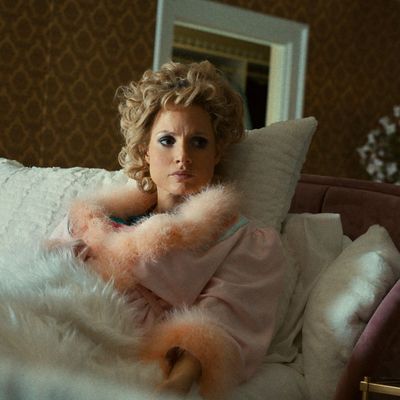
Tammy Faye Bakker was a camp icon for reasons that are immediately clear when watching any footage of her at work. She was a straight, cis woman who performed femininity with an intensity more often found in drag. When she spoke, it was with a high chirrup that evoked Betty Boop, and when she sang, she gestured emphatically as if trying to transmit her song by way of her whole body instead of just her voice. She favored big hair and heavy makeup that included the spider-leg eyelashes that were her signature, though the lingering image of mascara-blackened tears streaming down her face probably owes more to SCTV and SNL than to her own appearances. Bakker — née LaValley, and later Messner — did cry a lot on camera, so she was adamant about wearing waterproof mascara. She helped her first husband, the televangelist Jim Bakker, build an empire that ruthlessly melded faith with commerce. But she somehow retained an aura of blamelessness even as everything collapsed in charges of fraud and an allegation of sexual assault in 1987, as though her gaudy guilelessness shielded her from any taint of complicity.
Bakker may have been what Susan Sontag called naïve camp, but The Eyes of Tammy Faye is definitely deliberate camp, which, as Sontag put it, is “usually less satisfying.” The film, which was directed by Michael Showalter and adapted from a 2000 documentary of the same name, might be more satisfying if it actually had a sense of why Tammy Faye Bakker is a good subject. Instead, it treats her as a collection of elements that allow for an outsize performance — and it gets a hell of one from Jessica Chastain. She does a lot of singing and crying, thickens her vowels into a Minnesota accent, dresses in an increasingly outrageous array of ’60s, ’70s, and ’80s outfits, and dabbles in puppetry. But she’s left relying only on these exterior-facing bits of business, because The Eyes of Tammy Faye, which was written by Abe Sylvia, is unable to decide if it wants to understand its subject or make fun of her, and ends up never really committing to either.
Instead, the movie tries to give Bakker a half-hearted “You’re Wrong About” treatment, as though it weren’t just reiterating what has long been her main narrative — that she was ridiculous but also sincere, unlike the cynics she was surrounded by, who used religion for personal gain or political power. She also defied fundamentalist church patriarchy by embracing glamour, talking about sex, and supporting LGBT rights, famously interviewing activist and pastor Steve Pieters about his AIDS diagnosis on air. At the same time, the film skims over what Tammy Faye really thought about the prosperity gospel that Jim Bakker (a bleating Andrew Garfield) espoused from early on, about his certainty that God wanted them to have nice things and how that led to their mansion by the lake and dreams of opening a theme park. Tammy Faye’s dour mother, played by Cherry Jones, scolds her daughter for being so oblivious to the opportunism of what she and her husband are doing. (“Serving God don’t feel like it should be a money-making opportunity!”) But Tammy Faye herself simply and blithely goes along for the ride.
Well, most of the time. The most intriguing moments in The Eyes of Tammy Faye are the ones that suggest its title character is far more canny than her wide-eyed act makes her appear — like when she Lady Macbeths Jim past his instinct to genuflect at the feet of Pat Robertson (Gabriel Olds) and Jerry Falwell (Vincent D’Onofrio), or when she secures their company credit from a developer with a combination of faith-based fervor and flirtation. But the movie doesn’t know how to square the idea of Tammy Faye as savvy and self-aware with Tammy Faye as a ditzy innocent, and Chastain plays both without bringing them together into a coherent sense of character.
Bakker rose to fame during a time that was pivotal to our current sense of Evangelical Christianity as a cultural designation as much as, if not more than, a religious one. The Eyes of Tammy Faye certainly seems aware of that, with D’Onofrio’s glowering Falwell talking about his battles with the “liberal agenda” and the support he was able to throw behind Ronald Reagan. But those elements get pushed to the background in favor of Tammy Faye’s pill habit and her growing isolation from Jim, whose side she nevertheless stays by through blame, scandal, confessions of infidelity, and some suspiciously enthusiastic grappling with his assistant, Richard Fletcher (Louis Cancelmi). There’s a convoluted doublethink necessary to be a woman demanding power and a degree of liberty while working on behalf of a religious framework that doesn’t support either. But while the film is aware of that, it’s not really interested in doing more than shaking its head at the hypocrisy. The Eyes of Tammy Faye may have fake eyelashes in abundance, but it has no teeth.


